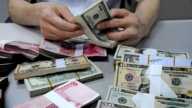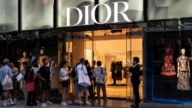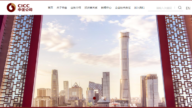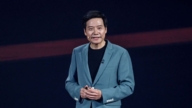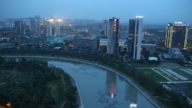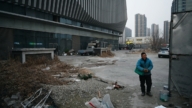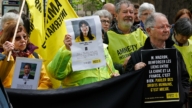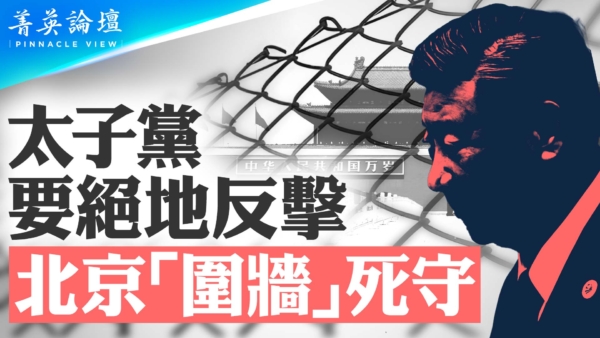【新唐人2013年09月11日讯】日前中共总理李克强在国外媒体上发表文章,安抚国际社会,不要担心中国经济“硬着陆”, 李克强并提出了一系列改革措施。但评论指出,这篇文章与习、李之前所说﹕中国经济存在诸多困难,前后矛盾。我们一起来看看为什么?
9月9号,英国《金融时报》中文网,刊登了一篇署名“中共国务院总理李克强”的文章。文章中说,本周即将在中国大连举行的夏季“达沃斯论坛”,吸引了世界的目光,人们期待从这里获得中国政府的信号。有观察人士问,中国经济增速放缓的趋势,是否最终会导致大幅下滑,甚至“硬着陆”?中国的改革开放之路,是否会因各种复杂的社会难题而脱轨?李克强回答:中国将保持经济长期健康发展,中国将继续走改革开放之路。
文章还说,中国的经济,上半年GDP同比增长7.6%﹔5%的调查失业率和2.4%的通胀率,都处于合理、可控范围。
时政评论家蓝述:“他不能承认中国面临巨大的问题,他承认了以后,首先他手上的砝码就变轻了,同时还会面临更大规模的外资的撤资。”
时政评论家蓝述指出,李克强的这些讲话,和前一阵他透露的﹕中国经济面临困难,有矛盾。4月底,李克强会见阿根廷众议长时,承认中国经济面临一些困难和风险挑战。
9月3号,中共国家主席习近平在出访中亚四国前,回答记者关于中国经济增长趋缓问题时也承认,中国大陆确实面临地方政府债务、和部分行业产能过剩等困难。
蓝述:“那困难在什么地方呢,他讲得很清楚了,就是利益集团,他直接点出来的像石油、电信、铁路等等,通过一种比较委婉的方式讲出来了。习、李目前要在中国搞改革,他们所面临的最大的的绊脚石,就是整个江氏集团这些上上下下的既得利益的官员。”
美国南卡罗莱纳大学艾肯商学院教授谢田:“一般共产党人讲话,都是打折扣的,掩盖事实的真相,淡化或虚化事实的严重程度,我想中共总理说中国经济面临困境的时候,问题已经相当严重了。”
李克强在文章中还提出,将进一步通过简政放权,推进结构改革,发展混合所有制经济,继续推进行政管理、财税、金融、价格等改革,扩大内需等等。
谢田:“其实这都是一种脚痛医脚,头痛医头,实际上都没有涉及到真正问题的实质,李克强他们自己也承认,那些经济政策遭到了利益集团的阻扰,所谓的利益集团就是中共的统治集团,就是中共家族权势裙带关系,掌控了中国的经济命脉,毫无忌惮的大肆盗窃国家财富。”
台湾媒体曾经分析指出,习、李政权要克服这波经济危机,面对的绝非经济问题而已,而是政治问题,最大对手则是利益团体的阻挠。
香港媒体日前曝光,中共内部自称,即将进行的三中全会,以“深化改革”为主要议题,但存在“三大阻力”和“五大干扰”,其中包括,失业率高、物价通胀、医疗、教育等社会保障存在的问题得不到纾缓、解决,而引发事件。
9月6号,李克强主持中共国务院常务会议时强调,尽快在金融、石油、电力、铁路、电信、资源开发和公用事业领域推出一些项目,引入民间资本投资,为民间投资“松绑开路”。
谢田:“中共利益集团的垄断权力,这些垄断权力都是从政治上来的,这些政治权利得不到废除的话,中共的统治得不到解除的话,民间的投资根本得不到保障,我想中国的民间资本也不会那么轻易的再相信中共说的任何事情。”
50年代,中共为了侵吞资本家的财产,提出公私合营,从而达到了消灭资本家的目地。最近香港富商李嘉诚抛售中国产业转战欧洲,被经济学家解读为﹕中国经济面临崩盘的信号。
采访编辑/刘惠 后制/李智远
Li Keqiang Published Article On Foreign Media Contradict Previous Saying
Recently, Premier Li Keqiang published an article
through a foreign media.
Li told the world that is no need to worry about
China’s economic hard landing.
Li introduced a series of reform measures in the article.
However, commentators pointed out this article contradicted
previous talks from Xi Jinping and Li himself.
They said China’s economy faces many difficulties.
Let’s take a look.
On Sept. 9, UK’s Financial Times Chinese edition website
published an article written by Li Keqiang.
The article said The Summer Davos Forum which opens
this week in Dalian will draw the world’s people’s attention.
The international community expects to learn some
information about the regime.
Li said observers ask whether China’s economic slowdown
will cause a sharp decline or even a hard landing.
Will China’s reform process go astray due to its
complex social problems?
Li answered that China’s economy will maintain
it’s sustained and healthy growth.
China will continue to walk its path of reform and opening up.
The article said China’s GDP in the first six months
grew by 7.6% year-on-year.
The 5% unemployment rate and 2.4% inflation rate are
within the reasonable and manageable range.
Lan Shu, current affairs commentator says that Li’s article
contradicts what he said earlier: China’s economy faces difficulty.
In April, Li met with Julian Dominguez, President of the
Argentine chamber of Deputies.
Li admitted in the meeting that China is facing financial
difficulties and challenges.
On Sept. 3, before the Chinese Communist Party (CCP) leader
Xi Jinping started his Asian tour, Xi answered questions in a
press conference about China’s economic growth.
Xi said China was indeed facing government debt, and
some overcapacity and other difficulties.
Lan Shu: “What are the difficulties? Xi has clearly stated that
it is interest groups who control oil, telecommunication, rail etc.
Xi pointed it out in a gentle way.
Xi and Li vowed to implement reform in China, however, the
biggest obstacle they are facing is Jiang Zemin’s interest group.”
Xie Tian, Professor at Aiken Business School, University of
South Carolina: “Generally, the CCP’s words are untrustworthy.
They cover up the truth, hide the severity of the facts and blur
the details.
I think when Li Keqiang mentioned China has faced
economic difficulty, it means the problem is severe.”
Li Keqiang said in his article that China will continue to
streamline government and delegation power, press ahead with
structural changes and grow economic sectors.
China will advance reforms of administrative management,
fiscal and tax systems, financial sectors and pricing.
Xie Tian: “Actually, this is like if someone had foot pains to
cure feet, got a headache to cure headache.
It hasn’t resolved the actual problem.
Li Keqiang and others had admitted that economic reform
has encountered obstructions.
The interest group is the CCP ruling clique.
It is CCP nepotism controling China’s economy, and
seizing national wealth without fear.”
Taiwan’s media analyzed that if Xi and Li want to overcome
this economic crisis, they not only face economic problems,
but also a political one. The biggest political problem is the
interest group’s resistance.
Recently, Hong Kong media reported the CCP says its next
Third Plenary Session agenda will focus on “deepening reform”.
However, there are three resistances and five interferences,
including unemployment, inflation, healthcare, education
and other social security issues that can not be relieved or
resolved, which caused many incidents.
On Sept. 6, Li chaired the State Council meeting.
Li stressed that as soon as possible they will launch projects in
the industries of finance, oil, electricity, railways, telecoms,
resource development and public utilities. By introducing private
fund investment, they pave the road for private investment.
Xie Tian: “Regarding the CCP monopoly of power,
I think it comes from political monopoly.
If the political powers cannot be abolished, and the CCP power
cannot be removed,the private investment still cannot be protected,
and private investors will not easily trust what the CCP has said.”
In 1950s, in order to seize capitalists’ assets, the CCP merged
public and private assets.
So it achieved its purpose of eliminating capitalists.
Recently, Hong Kong’s tycoon Li Ka-shing announced
the sale of his assets in China, instead transferring to Europe.
Economists interpreted that it was sign of collapse
of China’s economy.


